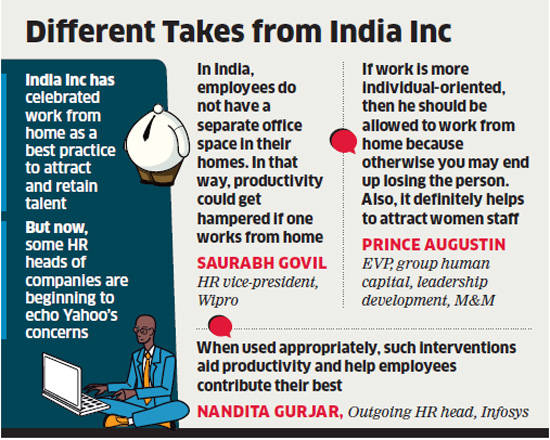Soon after internet giant Yahoo took away employee freedom to work from home, Indian companies are slowly voicing hitherto unexpressed concerns about productivity losses such flexibility may cause. “Flexitime is a utopian concept that is not going to help anyone,” says K Ramkumar, Executive Director, ICICI Bank.
“Whatever is not natural to the market and commerce, will not work. Customer is the king.” India Inc has mostly celebrated work from home or remote work as a best practice to attract and retain talent. Hardly anyone has yet voiced concerns of productivity losses such practices may cause.
“Speed and quality are often sacrificed when we work from home,” a Yahoo memo announcing the rollback observed. “Some of the best decisions and insights come from hallway and cafeteria discussions, meeting new people, and impromptu team meetings,” it added.
Some HR heads of companies that have given employees such flexibility are now beginning to echo Yahoo’s concerns. None of them have yet moved to curb the practice, nor have they given any indication that they may consider such a move. “In India, unlike the west, employees do not have a separate office space in their homes. In that way, productivity could get hampered if one works from home,” says Saurabh Govil, vice-president HR, Wipro.The company offers flexi-work on a case-to-case basis. In the US though, Wipro has been asking its people to come to office, especially those who do not have to stay at customer’s site. “Coming to office helps in developing a culture that is crucial; even small water cooler conversations are important,” Govil adds. Srimathi Shivashankar, AVP & Head – Diversity & Sustainability, HCL Technologies, says working out of home in India is quite challenging.
“If you ask me whether Indian homes give women/men this kind of work ambience then my answer is no,” she says. There are many reasons for this. Firstly, extended family members have very little understanding that working from home is equivalent to working at office and that the individual should be supported to stay productive.
Secondly, the household support staff do take holidays, leaving the individual working from home with household chores. Thirdly, when it comes to telecommunication/calls/online meetings, Indian households with noisy surroundings have a good distance to traverse vis-a-vis our western counterparts. Fourthly, network connectivity and security is still an issue in many cities. Lastly, power cuts across Indian states also act as a dampener on productivity. HCL Technologies introduced flexiwork options one-and-a-half year ago despite these challenges. Unlike 5-6 years ago, when such flexibility first found its way into Indian workplaces, the pressures of the recent economic slowdown may also be forcing companies to reconsider their assumptions.
“Now companies have other concerns like top line and bottom line. They are insisting on ownership and accountability from their employees,” says Saundarya Rajesh, founder president, AVTAR Career Creators & FLEXI Careers India. Mahindra & Mahindra, which employs 150,000 employees, says such flexibility works only when there is a structure around it. It works only where one can measure productivity and performance, says Prince Augustin, EVP – Group Human Capital & Leadership Development at Mahindra & Mahindra.
The Economic Times published the article here

